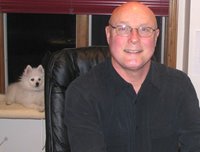A WELL CONSIDERED PATRIOTISM
This commentary appeared in The Fargo Forum on June 29, 2008.
I learned as a child that patriotism is love of our country and devotion to the ideals we believe in. Patriots are people who act courageously for their country. I love America, but never thought of myself as a patriot—that title was reserved for those who sacrificed greatly for the rest of us—usually on the battlefield.
Somehow over the years the definition and symbols of patriotism changed for some to a narrow and shallow aberration disrespectful to true patriots: lapel pins, polarization, empty swagger, artificial conflicts, and a refusal to admit mistakes or errors of policy.
Patriotism became a bludgeon used to intimidate anyone who criticized these pseudo-patriots or their policies in an effort to silence dissent and to deceive, frighten, and manipulate citizens. Even obvious patriots like John McCain and John Kerry were not immune from vile personal attacks. Concomitantly mediocre political leadership became the norm, and our nation’s problems grew in number and complexity as gridlock prevails in Washington.
This year’s presidential election promises to be definitive for America. We face many intertwined problems that demand an end to obstruction: two wars, a recession, energy costs, an overheated planet, a health care crisis, unlawful immigration, and a loss of respect around the world.
Already the dark side of patriotism rears its ugly head as some try to frighten us about Barack Obama. Those who demonize him cry out: “He doesn’t wear a lapel pin! He’s not patriotic! His middle name is Hussein! He’s not like us, and his wife hates America!” Such foolishness. We can be better people.
Mike Huckabee, former presidential candidate got it right, “Elections ought to be about elevating the best ideas and exposing the worst ones—not engaging in character assassination with half truths, innuendoes, and disputable ‘internet facts.’”
We need a broader and deeper definition of patriotism today—a “well-considered patriotism” that Alexis De Tocqueville wrote of in “Democracy in America” that is rational, creative, and enlightened.
Eric Liu and Nick Hanauer wrote an important new book, “The True Patriot.”
True patriots, they wrote, “believe that freedom from responsibility is selfishness, freedom from sacrifice is cowardice, freedom from tolerance is prejudice, freedom for stewardship is exploitation, and freedom from compassion is cruelty.” Each of us can get engaged and give of ourselves for love of country—to be a patriot—not just on the battlefield but also in everyday life.
We can pay attention, become informed, get involved, and tell the truth.
We can see through lies, distortions, partial truths, political spin, misrepresentations, and intellectual dishonesty. We can say “NO” to mock patriotism, unenlightened egoism, and its selfish ends. We can stand up to those who try to corrupt our political process.
The problem in the world is not the liars, the manipulators, or the fear-mongers. The issue is the good people who have gone to sleep. They need to wake up, stand up, and speak up against those who appeal to the most irrational of our fears. We can renew our public morality as we redefine what it means to be a patriot. Future generations demand this of us.
When someone sends us a dishonest email about a candidate, we can refuse to pass the message on and return it with criticism. We can refuse to listen to radio and watch television that tear people down. We can write letters to the editor and confront intellectual dishonesty on the editorial pages. We can make this election about ideas and solutions instead of character assassination. We cannot afford to be fooled again by the politics of fear-mongering and manipulation. We need aware, informed, and courageous citizens who raise our public standards.
Robert Kennedy said in 1968, “I am dissatisfied with our society.” Eighty percent of Americans feel the same today 40 years later. Kennedy stood for economic fairness, a thoughtful foreign policy, and justice and opportunity for all—principles in need of renewal today.
A well considered patriotism loves country always and from this tough love of country sees clearly and confronts our nation’s flaws and finds creative solutions to the problems that seem insolvable.
As the 4th of July approaches each of us might reflect on what patriotism means to us. Patriotism belongs to us all and each of us can be a patriot. If we say no to character assassination and attack our nation’s problems with the fervor of a patriot’s love, we will be energized, and we will evolve America.

